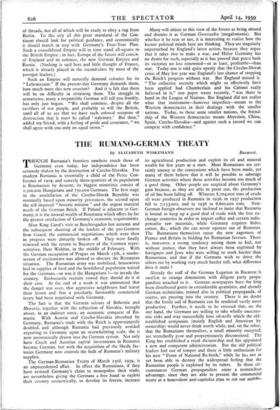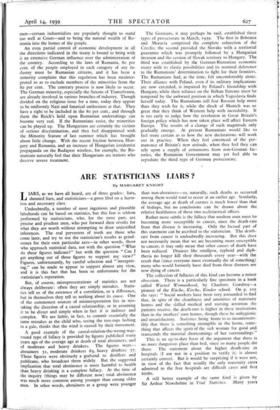THE RUMANO-GERMAN TREATY
By ELIZABETH WISKEMANN
Bucarest.
THOUGH Rumania's frontiers nowhere touch those of Germany even today, her independence has been seriously shaken by the destruction of Czecho-Slovakia. For modern Rumania is essentially a child' of the Peace Con- ference of 1919, and scarcely three-quarters of its population is Roumanian by descent; its biggest minorities consist of 1,500,000 Hungarians and 750,000 Germans. The first stage in the annihilation of the Czecho-Slovak Republic was nominally based upon minority grievances, the second upon the self-imposed " historic mission " and the urgent material needs of the German Reich. If Poland is adjacent to Ger- many, it is the natural wealth of Roumania which offers by far the greater satisfaction of Germany's economic requirements.
After King Carol's visit to Berchtesgaden last autumn and the subsequent shooting of the leaders of the pro-German Iron Guard, the commercial negotiations which were then in progress were abruptly broken off. They were finally renewed with the return to Bucarest of the German repre- sentative, Herr Wohltat, in the middle of February. With the German occupation of Prague on March 15th, a smoke- screen of excitements was allowed to• obscure the Rumanian situation. The Rumanian army was mobilised, housewives laid in supplies of food and the bewildered population waited for the Germans—or was it the Hungarians ?—to invade the country. Enthusiastic recruits vowed they should do it at their cost. At the end of a week it was announced that the danger was over, that aggressive neighbours had learnt their lesson and that a peculiarly favourable commercial treaty had been negotiated with Germany.
The fact is that the German seizure of Bohemia and Moravia, together with the subjection of Slovakia, brought about, in an indirect sense, an economic conquest of Ru- mania. With Austria and Czecho-Slovakia absorbed by Germany, Rumania's trade with the Reich is approximately doubled, and although Rumania had previously avoided exporting to Germany upon an overwhelming scale, she is now automatically drawn into the German system. Not only have Czech and Austrian capital investments in Rumania become German, but with the acquisition of the Skoda fac- tories Germany now controls the bulk of Rumania's military supplies.
The German-Rumanian Treaty of March 23rd, 1939, is an unprecedented affair. In effect the Rumanians, if they have resisted Germany's claim to monopolise their trade, are nevertheless giving the Germans a free hand to exploit their country economically, to develop its forests, increase its agricultural production and exploit its oil and mineral wealth for five years as a start. Most Rumanians are cer- tainly uneasy at the concessions which have been made, yet many of them believe that it will be possible to sabotage German activities where these activities become too much of a good thing. Other people are sceptical about Germany's gain because, as they are able to point out, the production of oil has been falling off. Whereas 8,704,000 tons of crude oil were produced in Rumania in 1936, in 1937 production fell to 7,153,000, and in 1938 to 6,600,000 tons. Non- German foreign observers are inclined to insist that Rumania is bound to keep up a good deal of trade with the free ex- change countries in order to import coffee and certain indis- pensable raw materials, while Germany requires hides, cotton, &c., which she can never squeeze out of Rumania. The Rumanians themselves enjoy the new eagerness of France and Britain in bidding for Rumanian favours. There is, moreover, a strong tendency among them to feel, not without justice, that they have always been exploited by foreigners and Jews who were willing to work harder than Rumanians, and that if the Germans wish to drive the others out by working very much harder still, what difference does it make ?
Already the staff of the German Legation in Bucarest is swollen to strange dimensions with diligent party propa- gandists attached to it. German newspapers have for long been distributed gratis in considerable quantities, and already German technicians, trained also in political propaganda, of course, are pouring into the country. There is no doubt that the fertile soil of Rumania can be rendered vastly more productive. Further, it needs to be stressed that, on the one hand, the Germans are willing to take wholly unecono- mic risks and may successfully bore oil-wells which the old- established companies (mainly English and American by ownership) would never think worth while, and, on the other, that the Rumanians themselves, a small minority excepted, are wretchedly poor and proportionately discontented. The King has established a royal dictatorship and has appointed a new and competent administration. But the old political leaders feel out of temper and there is little enthusiasm for his new " Front of National Re-birth," while he has not as yet been able to destroy the widespread feeling that the Rumanian people is exploited by its rulers. In these cir- cumstances German propagandists enjoy a tremendous advantage; since they are able to present the commercial treaty as a benevolent anti-capitalist plan to cut out middle- men—certain industrialists are popularly thought to stand too well at Court—and to bring the natural wealth of Ru- mania into the homes of the people.
An even partial control of economic development in all the directions indicated in the treaty is bound to bring with it an extensive German influence over the administration of the country. According to the laws of Rumania, 8o per cent. of the people employed in each category of any in- dustry must be Rumanian citizens, and it has been a minority complaint that this regulation has been misinter- preted so as to exclude members of the minorities from the 80 per cent. The contrary process is now likely to occur. The German minority, especially the Saxons of Transylvania, are already involved in various branches of industry. Though divided on the religious issue for a time, today they appear to be uniformly Nazi and fanatical enthusiasts at that. They have a right to be included in the 8o per cent., and through them the Reich's hold upon Rumanian undertakings can become very real. If the Rumanians resist, the minorities can be played up. The Hungarians are certainly the victims of serious discrimination, and they feel disappointed with the Minority Statute of last summer which has brought about little change. With the recent friction between Hun- gary and Rumania, and an increase of Hungarian irredentist propaganda on the Budapest wireless, for example, the Ru- manians naturally feel that their Hungarians are traitors who deserve severe treatment. The Germans, it may perhaps be said, established three types of protectorate in March, 5939. The first in Bohemia and Moravia comprised the complete subjection of the Czechs; the second provided the Slovaks with a territorial guarantee which was promptly followed by a Hungarian invasion and the cession of Slovak territory to Hungary. The third was established by the German-Rumanian economic treaty with its elastic possibilities and its nominal deference to the Rumanians' determination to fight for their frontiers. The Rumanians had, at the time, felt uncomfortably alone. Their alliance with Poland, even if its military implications are now extended, is impaired by Poland's friendship with Hungary, while their reliance on the Balkan Entente must be tempered by the awkward position in which Yugoslavia finds herself today. The Rumanians still fear Russian help more than they wish for it, while the shock of Munich was so great that they think of Western help with incredulity. It is too early to judge how the revolution in Great Britain's foreign policy which has now taken place will affect Eastern Europe. The results of a change of such magnitude only gradually emerge. At present Rumanians would like to feel more certain as to how the new declarations will work out in practice. When they feel convinced of the per- manence of Britain's new attitude, when they feel they can rely upon a supply of armaments from non-German fac- tories, the Rumanian Government may yet feel able to repudiate the third type of German protectorate.







































 Previous page
Previous page